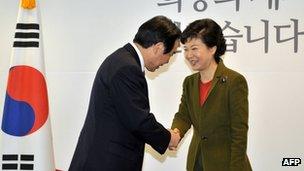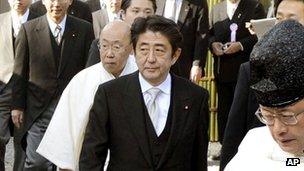Japan sends envoy to soothe ties with South Korea
- Published

Japanese envoy Mr Nukaga (L) met with Ms Park in Seoul
A Japanese special envoy has met the South Korean president-elect in Seoul in a move aimed at helping soothe relations between the two countries.
New Japanese Prime Minister Shinzo Abe sent envoy Fukushiro Nukaga to deliver a letter to South Korean President-elect Park Geun-hye.
The two states have been involved in a prolonged row over disputed islands.
Mr Abe was sworn in in December, while Ms Park is set to assume office next month.
Diplomatic relations became tense after South Korean President Lee Myung-bak made a surprise visit last year to the disputed islands known as Dokdo in South Korea and Takeshima in Japan.
North Korea also claims the islands, which consist of two main islands and about 30 smaller rocks, the waters of which are seen as valuable fishing grounds.
A South Korean coastguard detachment has been stationed at the disputed islands since 1954.
'Mutual effort'
"At a time when a new government starts [in both countries] I hope we can make a mutual effort to build trust based on people's sentiment and strengthen our bilateral ties in various fields," Ms Park said during the meeting.
She had turned down an earlier request for a meeting with Japan last month, citing a tight schedule.
Mr Nukaga went to Japan saying he wanted to "play the role of mediator so that this year can be a good one for the two countries".
The talks have been met with some protests in South Korea. One of the demonstrators, a 63-year-old man, stabbed himself in the stomach with a knife. The man had also previously rammed his truck into the Japanese embassy's gate last year, reports Yonhap news agency. That incident prompted a diplomatic protest from Japan.
Relations between Seoul and Tokyo have frequently been troubled by issues from their shared history - including Japan's use of military sex slaves or "comfort women" during World War II, says the BBC's Lucy Williamson in Seoul.

Mr Abe was sworn in as Japan's prime minister in December
Many had judged that Japan's new nationalist leadership would mean further tensions on such issues, but others have pointed to the economic and security incentives for both countries to work together, our correspondent adds.
Arsonist sent home
Mr Abe had said earlier this week that he wanted to make a good start with South Korea.
On Friday, however, he criticised the country's refusal to extradite to Japan a Chinese man wanted over a 2011 arson attack on the Yasukuni shrine in Tokyo, where Japan's war dead are buried.
The court in Seoul sent Liu Qiang home to China, saying he might not get a fair trial in Japan. He had spent 10 months in jail in South Korea for a separate arson attack on the Japanese embassy in Seoul.
Mr Abe said the decision was "extremely regrettable". China's foreign ministry welcomed the ruling.
Japan and China are involved in a separate territorial dispute in the East China Sea.
- Published5 October 2012
- Published5 October 2012
- Published10 August 2012
- Published9 July 2012